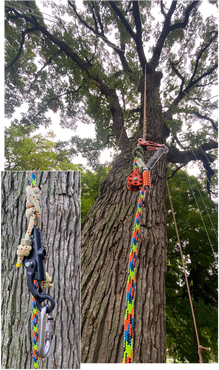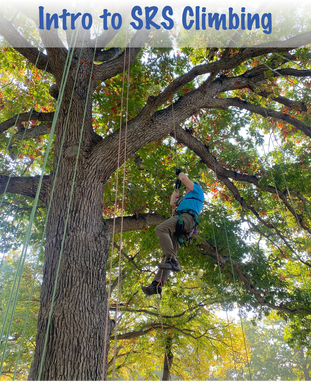Intro to SRS Climbing: Stationary Rope Systems & Techniques
(1-Day Class)
|
2024 Class Offerings
APRIL 5 (Fri) SEPTEMBER 17 (Tue) - All classes held in Waukesha County, WI -
- Class Time: 9:00am-3:00pm - - Capacity: 2 students - - Ages: adults, 18yrs+ - |
Price: $345.00 per person
Includes: - 6-hrs class instruction - Copy of Intro to Stationary Rope Systems manual & reference guide - 2 post-class climbing opportunities with Treetop Explorer instructor and use of our climbing equipment. - All equipment needed for participation |
 SRS systems and techniques can certainly speed up your ascent, and some climbers find the technique better suited than MRS in certain situations.
SRS systems and techniques can certainly speed up your ascent, and some climbers find the technique better suited than MRS in certain situations.
INTRO TO SRS CLIMBING
Advancements in technical tree climbing equipment have brought SRS into the mainstream. The forces applied to the tree and your body are different than those in MRS climbing. It is necessary to understand and take these considerations into account to optimize your performance and minimize your risk for injury.
Learn the basics of SRS/SRT climbing systems, equipment, ascent, and maneuvering techniques. Stationary Rope Systems can expedite your ascent, reduce fatigue, and improve efficiency. You will be introduced to new techniques, but you will find that SRS also utilizes simple modifications to your current style of climbing.
Stationary Rope Systems may be intimidating to get into as they have more components than MRS setups. The number of different SRS devices can be overwhelming. If you have been reluctant to get into SRS for these reasons, this class will introduce you to SRS forces, tehcniques, and devices in a simplified manner.
While there are numerous SRS climbing systems to choose from, they all fall into 2 types: mechanical or hybrid (utilizing a hitch cord w/mechanical assist). You will be introduced to both types.
Pre-requisite: MRS/DdRT proficiency, previous student of our Beginning Tree Climbing class, or equivalent trainings & experience (with instructor approval). Existing knowledge and practical understanding of tree inspections, tie-in-point evaluation, and tree dynamics are necessary for climbers looking to enroll in this course.
Advancements in technical tree climbing equipment have brought SRS into the mainstream. The forces applied to the tree and your body are different than those in MRS climbing. It is necessary to understand and take these considerations into account to optimize your performance and minimize your risk for injury.
Learn the basics of SRS/SRT climbing systems, equipment, ascent, and maneuvering techniques. Stationary Rope Systems can expedite your ascent, reduce fatigue, and improve efficiency. You will be introduced to new techniques, but you will find that SRS also utilizes simple modifications to your current style of climbing.
Stationary Rope Systems may be intimidating to get into as they have more components than MRS setups. The number of different SRS devices can be overwhelming. If you have been reluctant to get into SRS for these reasons, this class will introduce you to SRS forces, tehcniques, and devices in a simplified manner.
While there are numerous SRS climbing systems to choose from, they all fall into 2 types: mechanical or hybrid (utilizing a hitch cord w/mechanical assist). You will be introduced to both types.
Pre-requisite: MRS/DdRT proficiency, previous student of our Beginning Tree Climbing class, or equivalent trainings & experience (with instructor approval). Existing knowledge and practical understanding of tree inspections, tie-in-point evaluation, and tree dynamics are necessary for climbers looking to enroll in this course.
Topics covered include: Force & load dynamics | Climbing system installation & set-up | Rope anchoring systems | Mechanical & Hybrid Devices | High-Performance Friction Hitches | Rope-walking Ascent | Safety & self-rescue
Hybrid SRS Devices: Hitch Hiker | Rope Wrench
Mechanical SRS Devices: Akimbo | Rope Runner | Rope Runner Pro | Unicender | Zig-Zag/Chicane
Alternative SRS Techniqes: You can opt to learn climbing systems used more often by climbers from other rope climbing disciplines such as spelunking. These systems utilize one-direction devices; one for ascent & switching to another for descent. Systems/Techniques include the Texas Kick, Frog Walker, Yo-Yo/RAD, and variations. Examples of devices used include: hand, chest, and foot ascenders for ascent, and racks, I'D, RIG for descent. These are also the systems that were commonly used by forest canopy scientists & researchers; however, given the advancements in SRS tree climbing devices, canopy scientists should contact us as we can custom design a 3-day MRS/SRS geared towards the skills that will be most useful during your data collection travels,
Hybrid SRS Devices: Hitch Hiker | Rope Wrench
Mechanical SRS Devices: Akimbo | Rope Runner | Rope Runner Pro | Unicender | Zig-Zag/Chicane
Alternative SRS Techniqes: You can opt to learn climbing systems used more often by climbers from other rope climbing disciplines such as spelunking. These systems utilize one-direction devices; one for ascent & switching to another for descent. Systems/Techniques include the Texas Kick, Frog Walker, Yo-Yo/RAD, and variations. Examples of devices used include: hand, chest, and foot ascenders for ascent, and racks, I'D, RIG for descent. These are also the systems that were commonly used by forest canopy scientists & researchers; however, given the advancements in SRS tree climbing devices, canopy scientists should contact us as we can custom design a 3-day MRS/SRS geared towards the skills that will be most useful during your data collection travels,
NOTICE to arborists, tree care workers, tree climbers
The Intro to SRS Climbing class builds upon the skills covered in our Beginning Tree Climbing and Advanced MRS Climbing courses, or equivalent training programs. The information introduced in this class assumes you have developed proficiency in the basics related to tree inspection and climbing with an MRS/DdRT closed or open system. Understanding tree assessment to determine if a tree is structurally sound and identifying hazards to the climber is necessary when climbing trees, yet is not covered explicitly in this class. The information introduced in this class assumes you have developed proficiency in the basics related to tree inspection and climbing with an MRS/DdRT closed system (e.g. climbing on a taut-line or Blake's hitch). We do not cover pruning or rigging in this class.
Your instructor is an ISA Board Certified Master Arborist (BCMA), TCIA Certified Treecare Safety Professional (CTSP), TCIA Tree Care Academy qualified instructor, and holds TCIA SRT Climber, Aerial Rescue, Tree Climber Specialist, and Tree Care Specialist certificates.
The Intro to SRS Climbing class builds upon the skills covered in our Beginning Tree Climbing and Advanced MRS Climbing courses, or equivalent training programs. The information introduced in this class assumes you have developed proficiency in the basics related to tree inspection and climbing with an MRS/DdRT closed or open system. Understanding tree assessment to determine if a tree is structurally sound and identifying hazards to the climber is necessary when climbing trees, yet is not covered explicitly in this class. The information introduced in this class assumes you have developed proficiency in the basics related to tree inspection and climbing with an MRS/DdRT closed system (e.g. climbing on a taut-line or Blake's hitch). We do not cover pruning or rigging in this class.
Your instructor is an ISA Board Certified Master Arborist (BCMA), TCIA Certified Treecare Safety Professional (CTSP), TCIA Tree Care Academy qualified instructor, and holds TCIA SRT Climber, Aerial Rescue, Tree Climber Specialist, and Tree Care Specialist certificates.
NOTICE TO FOREST CANOPY SCIENTISTS & RESEARCHERS
Given the nature of forest canopy research and the locations where you will head to collect your data, most tree climbing classes offered for arborists or recreationalists are not sufficient to suit your needs. In many instances, a canopy researcher will need to utilize a combination of advanced MRS and SRS climbing systems. Climbing trees in forests and remote areas often involves needing to access taller than average trees and put you in a situation where understanding self-rescue techniques is necessity.
Most classes in technical tree climbing you will come across will likely touch on only one of these aspects, or cover skills that are more appropriate in urban areas and park settings. Even with our classes, each of the skills that will be of benefit to you are offered separately in each of our 4 main class offerings (Beginning Tree Climbing, Advanced MRS Climbing, Intro to SRS Climbing, Tree Climbing Facilitation (& rescue)).
We offer a custom-designed, 3-day course specifically for canopy scientists. The class introduces you to the foundational skills all tree climbers rely upon, a practical and useful combination MRS system and SRS conversion (tailored to your situation), tall tree entry, self-rescue, and other skills that can be beneficial in remote areas. As with our other courses, you are able to attend 4-post-class climbing opportunities for practice and additional assistance from your instructor (one of the more common mistakes people make is that they do not allow time to practice their skills before heading out to collect their data).
Given the nature of forest canopy research and the locations where you will head to collect your data, most tree climbing classes offered for arborists or recreationalists are not sufficient to suit your needs. In many instances, a canopy researcher will need to utilize a combination of advanced MRS and SRS climbing systems. Climbing trees in forests and remote areas often involves needing to access taller than average trees and put you in a situation where understanding self-rescue techniques is necessity.
Most classes in technical tree climbing you will come across will likely touch on only one of these aspects, or cover skills that are more appropriate in urban areas and park settings. Even with our classes, each of the skills that will be of benefit to you are offered separately in each of our 4 main class offerings (Beginning Tree Climbing, Advanced MRS Climbing, Intro to SRS Climbing, Tree Climbing Facilitation (& rescue)).
We offer a custom-designed, 3-day course specifically for canopy scientists. The class introduces you to the foundational skills all tree climbers rely upon, a practical and useful combination MRS system and SRS conversion (tailored to your situation), tall tree entry, self-rescue, and other skills that can be beneficial in remote areas. As with our other courses, you are able to attend 4-post-class climbing opportunities for practice and additional assistance from your instructor (one of the more common mistakes people make is that they do not allow time to practice their skills before heading out to collect their data).

Treetop Explorer climber training classes comply with the guidelines put forth by the Global Organization of Tree Climbers. Your instructor is a GOTC Recognized Master Instructor.

Treetop Explorer climber training classes comply with industry standards and guidelines put forth in the ANSI Z133 and are consistent with the best practice recommendations put forth by the International Society of Arboriculture and the Tree Care Industry Association. Your instructor is an I.S.A. Board Certified Master Arborist (BCMA) and T.C.I.A. Qualified Trainer & Certified Treecare Safety Professional (CTSP).
Learn-to-Climb Courses


